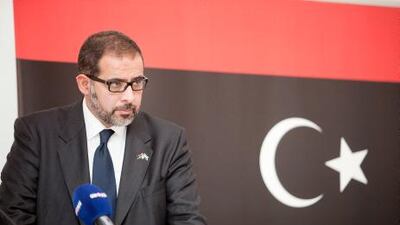Libya has enough cash to keep functioning for at least three months as it waits for funds and oil to flow, say rebel officials.
Video:Libya Stabilisation Team optimistic about Libya's economic development
The National's April Yee speaks to Wafik Shater, coordinator of the finance sector of the Libya Stabilisation Team, about their outlook and strategies to boost the Libyan economy.
Watch this video in full screen here
The fledgling government has been lobbying foreign authorities to release US$160 billion (Dh587.68bn) of frozen assets. Some $15bn is pegged for release from the EU and "several billions" are to come from the US and Canada, officials from Libya's National Transitional Council (NTC) said yesterday in Dubai.
Libya's central bank has enough cash to plug the gap for another three to six months, said Wafik Shater, the finance coordinator for the NTC's stablisation team.
"I don't want to give you the number - it's a closely guarded system," said Mr Shater, adding that the amount was "basically enough to cover the expenditure that we anticipate for the next three months for sure, possibly six months".
Gassem Azzoz, the new central bank governor, this month told reporters in Tripoli the bank was holding $115bn, with $90bn of that abroad.
Cash is vital to the rebels as they fight Muammar Qaddafi's last loyalists and restore essentials such as medical treatment and drinking water after a six-month civil war. But sanctions put in place to help topple Col Qaddafi have hampered the rebels in their early days.
Oil, which provided most government revenue before the uprising began in February, is expected by some analysts to take as long as three years to return to its full capacity of 1.6 million barrels per day.
Without full access to funds or fuel, NTC officials have sounded out international banks that might be willing to lend against the frozen assets, said Hatim Gheriani, an HSBC official coordinating Libya's emergency funds.
"It's something we hope for in the future," said Mr Gheriani. "Thus far, legalities have prevented the use of those assets for extending credit facilities to Libyan banks."
Officials painted a picture of a Tripoli returning to normal.
The stock exchange was preparing to reopen and 90 per cent of bank branches in the capital were operating, said Mr Shater.
HSBC would soon resume activities in Libya in "another sign of confidence", said Mr Gheriani, who also served as chief investment officer of Libya's sovereign wealth fund until last year.
The task of rebuilding could be an opportunity to diversify the country's economy away from oil, and manufacturing, tourism and the services sector could form the basis for new industry, said Mr Shater.

